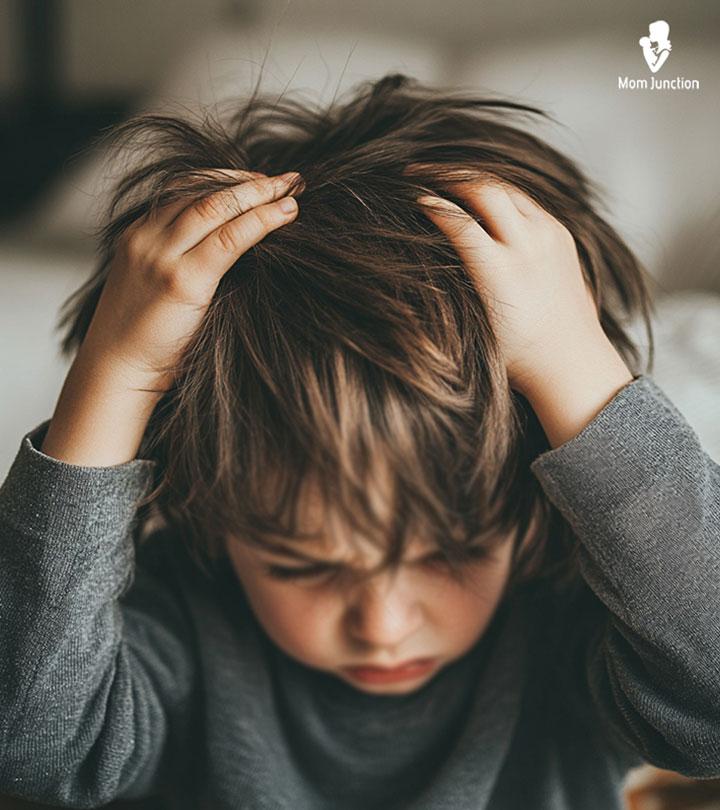
Image: Shutterstock
Mobile phones have become a necessity for people of all ages. But before giving one to your children, you should be aware of the effects of mobile phones on kids.
Phones have become a boon and a bane to society. They help us stay connected to people living far away from us and give us access to a world of opportunities. But on the other hand, addiction to phones can cause severe eye strain and impact their well-being (1).
So, if you are thinking of giving your child a mobile phone, we suggest you wait for a little longer. Read on as we state the facts about the effects that mobile phones have on children and suggest ways to reduce their exposure to the phones.
The graph shows the percentage of parents who think it is acceptable for their children to have a smartphone at a given age. While 4% of parents think it is unacceptable for children to have a smartphone at any age, 45% are fine giving it to kids in the age group of 12-14 years. Less than 1% are willing to give a phone to children less than two years of age.
Parents' opinion on when a child can own a smartphone
Source: Pew Research CenterBad Effects Of Mobile Phones On Children
Today’s children are growing up in a radio-frequency environment that never existed in human history before. The radiation emitted by mobile phones and mobile phone masts can have adverse effects on children. Some include:
1. Health Hazard:
In recent years, there has been a lot of speculation about the impact of cell phone radiation on our body. A study by The Journal of the American Medical Association stirred the debate when it investigated the repercussions the mobile phones could have on brain development. The possible health hazards of mobile phones on children are as follows:
A. Non-Malignant Tumors:
The study has shown that children who use mobile phones have the possibility of developing a non-malignant tumor in the brain and ear (2).
B. Cancer:
Image: IStock
The World Health Organization (WHO) has classified cell phone radiation as ‘possibly carcinogenic to humans’ (3). Children absorb more than 60% of the radiation into the brain than adults. It is believed that their brain’s thinner skin, tissues, and bones may make them more vulnerable to absorb the radiation twice as much as grown-ups; however, more research is needed to establish the finding (4). Their developing nervous system makes them more vulnerable to this ‘carcinogen’.
C. Effects On The Brain:
The radio waves from the mobile penetrate deep into the brain, not just around the ear. The disturbed brain activity could impair children’s learning ability, cognitive development, and other behavioral problems. It could even affect their mood and ability to learn in the classroom if they have used the phone during the break time (5).
 Research finds
Research finds2. Academics:
Image: IStock
Children, just like teens, are addicted to mobile phones. They play games, chat and talk to their friends on their mobile phone all the time. Along with the school supplies, many students take their mobile phones on their daily trips to their school. They talk on the phone during their free time and send messages during classes, which makes them unable to study without distraction. Thus, they miss the lesson taught and fall behind the other students in terms of academic performance (6).
3. Inappropriate Behavior:
Image: IStock
Use of cell phones can lead children to engage in inappropriate behaviors. Texting and sending inappropriate pictures is a growing problem with teens. The images go in the wrong hands, giving others access to the private photos. Children can also access pornographic sites from their technology devices (6).
4. Malpractice In Exams:
Image: IStock
Most students indulge in exam malpractices and cheating during internal and external examinations. Some make use of a calculator, while others store information in it. Some also use it to send answers for multiple choice questions to those in the examination hall. It can end the student’s career if caught (7).
5. Emotional Distress
Excessive mobile phone use can cause screen addiction, which can lead to loss of interest in hobbies or other social activities. It can also affect overall physical activity and interfere with sleep patterns. A combination of these factors can contribute to irritability, mood swings, and difficulty concentrating. Anxiety and depression are some common mental health issues associated with mobile phone overuse among children and adolescents (8).
6. Exposure To Commercials
Advertisements and commercials can have a significant impact on children. These ads often provide misleading information and employ manipulation tactics that influence children’s perceptions. They convince children they need a product or service, which pressures them and their parents to buy it (9). Hence, if a child uses a mobile phone, they are constantly exposed to such advertisements and commercials, which can affect their mental and emotional well-being.
 Did you know?
Did you know?Mobile Phone Safety For Kids
Image: IStock
As a parent, you must take preventive measures to minimize your child’s exposure to the harmful effects of mobile phones. When considering at what age should kids get a phone, it’s crucial to assess their maturity and readiness. Apart from this, you should also impart digital literacy to your children so that they use their mobile phones responsibly. Follow the following tips in this regard (2) (7) (10):
- Do not give a cell phone if your child is under 16 years. A child’s brain is too sensitive to withstand the effects of mobile radiation.
- Do not let your child hold a mobile phone directly up to their head. Use an air-tube headset instead.
- Do not let your child make calls in buses, trains, cars, and elevators. The mobile phone works harder to get the signal out through the metal, which increases the power level.
- Do not let your child use a cell phone when the signal is weak. It will increase the power to the maximum, as the phone attempts to connect to a new relay antenna.
- Limit the use of cell phones and screen time around children.
- Make sure that there is no mobile phone mast or network tower near your home or your kid’s school.
- Do not let children take mobile phones to school.
- Do not leave mobile phones in your children’s bedroom at night.
- Install parental control applications which allow you to control information accessible to the children and monitor it and your child’s privacy.
- Enroll your children in more outdoor activities like sports, music lessons, this occupies their time, while engaging them both physically and mentally
 Quick tip
Quick tipFrequently Asked Questions
1. Why are students addicted to their phones?
Students may become addicted to their phones for various reasons. It provides a means to stay connected with friends, offers entertainment through apps and media, grants access to vast information, and is a portable tool for stress relief and personal interests. The combination of social connectivity, entertainment, information accessibility, and convenience contributes to the allure of phone addiction among students.
2. How do I stop my child’s phone addiction?
To reduce your child’s phone addiction, set limits, encourage other activities, set a good example, consider removing phones from bedrooms, use phone-limiting apps, and have open conversations.
3. What are some warning signs of phone addiction in kids?
Some warning signs of phone addiction in kids include difficulty disconnecting from their phone or other gadgets, excessive preoccupation with their phone to the point where it interferes with other aspects of their life (such as schoolwork or social interactions), withdrawal or irritability when they are unable to use their phone, and neglecting their responsibilities or using their phone at the expense of other essential activities. These signs may indicate a problematic relationship with technology that requires attention and intervention.
The effects of mobile phones on kids can be drastically reduced by following specific guidelines. Using gadgets disrupts peace of mind, affects relationships, and eats up all your time. With the growing number of physical and mental health risks that its usage has shown, children should not have complete access to it. You can begin by reducing the number of hours for which they can have the phone with themselves, gradually increasing their free time to go outdoors and play with their friends.
Infographic: Mobile Phone Safety For Children
Mobile phones are a common part of daily life for children, who use them for communication and entertainment. Although they have several benefits, smartphones aren’t entirely risk-free. Thus, parental guidance is necessary. Read the following infographic to find practical tips you can follow to ensure safe and responsible mobile phone use by your child. Illustration: Momjunction Design Team
Key Pointers
- Mobile phone addiction can adversely affect the child’s eyesight, academics, peer group interactions, behaviors, and career.
- Mobile radiation could be carcinogenic, leading to non-malignant tumors, nervous system vulnerability, impaired learning, and behavioral problems in children.
- Limiting the use of phones, installing parental controls on the device, and not allowing the use of phones at school, during bedtime, and while traveling are a few mobile safety methods for children.
- Additionally, engaging children in physical or outdoor activities that do not require a phone can keep them active and help limit their phone time
Illustration: Harmful Effects Of Mobile Phones On Children
Image: Stable Diffusion/MomJunction Design Team
References
- Mobile Device Overuse Raises Child Myopia Risk
https://www.healthxchange.sg/children/childhood-conditions/children-mobile-devices-eye-problems - Cell Phone Radiation & Children’s Health: What Parents Need to Know
https://www.healthychildren.org/English/safety-prevention/all-around/Pages/Cell-Phone-Radiation-Childrens-Health.aspx - IARC classifies Radiofrequency Electromagnetic Fields as possibly carcinogenic to humans
https://www.iarc.who.int/pressrelease/iarc-classifies-radiofrequency-electromagnetic-fields-as-possibly-carcinogenic-to-humans/ - Kenneth R. Foster And Chung-Kwang Chou Are Children More Exposed to Radio Frequency Energy From Mobile Phones Than Adults?
https://ieeexplore.ieee.org/stamp/stamp.jsp?arnumber=6982034 - Children and Cell Phones: Is Phone Radiation Risky for Kids?
https://www.center4research.org/children-cell-phones-phone-radiation-risky-kids/ - Mahendra Singh Yadav et al.; (2021); Impact of mobile phone dependence on behavior and academic performance of adolescents in selected schools of Uttarakhand India
https://www.ncbi.nlm.nih.gov/pmc/articles/PMC8552249/ - What impact is technology having on student cheating?
https://wp.nyu.edu/ - What Effects Do Mobile Phones Have On Children And Young Peoples Mental Health
https://www.compass-uk.org/services/compass-changing-lives/what-effects-do-mobile-phones-have-on-children-and-young-peoples-mental-health/ - How Media Use Can Affect Kids.
https://kidshealth.org/en/parents/tv-affects-child.html - Children and Cell Phones: Weighing the Risks and Benefits.
https://www.nationwidechildrens.org/family-resources-education/700childrens/2018/10/children-and-cell-phones - Meta van den Heuvel et al.; (2019); Mobile Media Device Use is Associated with Expressive Language Delay in 18-Month-Old Children.
https://pubmed.ncbi.nlm.nih.gov/30753173/ - So Yeon Kim et al.; (2020); The relationship between smartphone overuse and sleep in younger children: a prospective cohort study.
https://www.ncbi.nlm.nih.gov/pmc/articles/PMC7954067/
Community Experiences
Join the conversation and become a part of our nurturing community! Share your stories, experiences, and insights to connect with fellow parents.
Read full bio of Dr. Maymunah Yusuf Kadiri
Read full bio of Sagari Gongala
Read full bio of Swati Patwal
Read full bio of Apoorva K





























